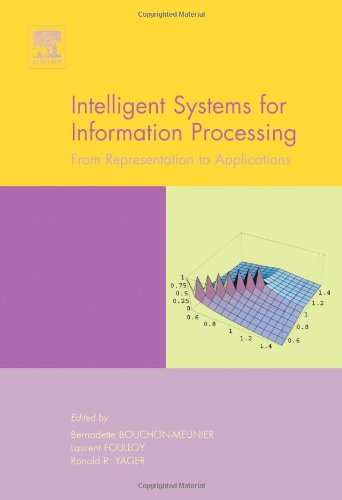

Most ebook files are in PDF format, so you can easily read them using various software such as Foxit Reader or directly on the Google Chrome browser.
Some ebook files are released by publishers in other formats such as .awz, .mobi, .epub, .fb2, etc. You may need to install specific software to read these formats on mobile/PC, such as Calibre.
Please read the tutorial at this link. https://ebooknice.com/page/post?id=faq
We offer FREE conversion to the popular formats you request; however, this may take some time. Therefore, right after payment, please email us, and we will try to provide the service as quickly as possible.
For some exceptional file formats or broken links (if any), please refrain from opening any disputes. Instead, email us first, and we will try to assist within a maximum of 6 hours.
EbookNice Team

Status:
Available5.0
27 reviews
ISBN 10: 0444513795
ISBN 13: 9780080525655
Author: B Bouchon Meunier, L Foulloy, Ronald R Yager
Intelligent systems are required to enhance the capacities being made available to us by the internet and other computer based technologies. The theory necessary to help providing solutions to difficult problems in the construction of intelligent systems are discussed. In particular, attention is paid to situations in which the available information and data may be imprecise, uncertain, incomplete or of a linguistic nature. Various methodologies to manage such information are discussed. Among these are the probabilistic, possibilistic, fuzzy, logical, evidential and network-based frameworks.
One purpose of the book is not to consider these methodologies separately, but rather to consider how they can be used cooperatively to better represent the multiplicity of modes of information. Topics in the book include representation of imperfect knowledge, fundamental issues in uncertainty, reasoning, information retrieval, learning and mining, as well as various applications.
Chapter 1: Toward a Perception-Based Theory of Probabilistic Reasoning with Imprecise Probabilities
Chapter 2: Rough Set Uncertainty in an Object Oriented Data Model
Chapter 3: On the Representation of Fuzzy Spatial Relations in Robot Maps
Chapter 4: Fuzzy "Between" Operators in the Framework of Fuzzy Orderings
Chapter 5: A Step towards Conceptually Improving Takagi-Sugeno's Approximation
Chapter 6: Combining Heterogeneous Information in Group Decision Making
Chapter 7: Function Approximation by Fuzzy Rough Sets
Chapter 8: Query Aggregation Reflecting Domain-knowledge
Chapter 9: Modelling of Fuzzy and Uncertain Spatio-Temporal Information in Databases: A Constraint-based Approach
Chapter 10: A General Framework for Meta-search based on Query-weighting and Numerical Aggregation Operators
Chapter 11: On the Comparison of Aggregates over Fuzzy Sets
Chapter 12: Towards an Intelligent Text Categorization for Web Resources: An Implementation
Chapter 13: Prototype Based Reasoning and Fuzzy Modeling
Chapter 14: Gradual Handling of Contradiction in Argumentation Frameworks
Chapter 15: Coherent Conditional Probability as a Tool for Default Reasoning
Chapter 16: Detecting Conflict-Free Assumption-Based Knowledge Bases
Chapter 17: Theory of Belief Functions: History and Prospects
Chapter 18: Towards Another Logical Interpretation of Theory of Evidence and a New Combination Rule
Chapter 19: Uncertainty, Type-2 Fuzzy Sets, and Footprints of Uncertainty
Chapter 20: Rough Sets, Bayes' Theorem and Flow Graphs
Chapter 21: Belief Revision as Combinatorial Optimization
Chapter 22: Showing why Measures of Quantified Beliefs are Belief Functions
Chapter 23: Extension of Coherent Lower Previsions to Unbounded Random Variables
Chapter 24: Clustering of Proximity Data using Belief Functions
Chapter 25: A Hierarchical Linguistic Clustering Algorithm for Prototype Induction
Chapter 26: A Multiobjective Genetic Algorithm for Feature Selection and Database Learning in Fuzzy Environments
Chapter 27: Mining Implication-Based Fuzzy Association Rules in Databases
Chapter 28: Learning Graphical Models by Extending Optimal Spanning Trees
Chapter 29: Clustering Belief Functions Based on Attracting and Conflicting Metalevel Evidence
Chapter 30: Models and Submodels of Fuzzy Theories
Chapter 31: Numerical Representations of Fuzzy Relational Systems
Chapter 32: Normal Forms for Fuzzy Relations and Their Contribution to Universal Approximation
Chapter 33: Associative Operators Based on t-Norms and t-Conorms
Chapter 34: Non-Analytical Approaches to Model-Based Fault Detection and Isolation
Chapter 35: A Hybrid Fuzzy-Fractal Approach for Time Series Analysis and Prediction and its Applications
Chapter 36: Linguistic Modeling of Physical Task Characteristics
Chapter 37: Validation of Diagnostic Models Using Graphical Belief Networks
Chapter 38: Adjustment of Parallel Queuing Processes by Multi-Agent Control
Chapter 39: Is She Gonna Like It? Automated Inspection System Using Fuzzy Aggregation
Tags: B Bouchon Meunier, L Foulloy, Ronald R Yager, Intelligent Systems, Representation